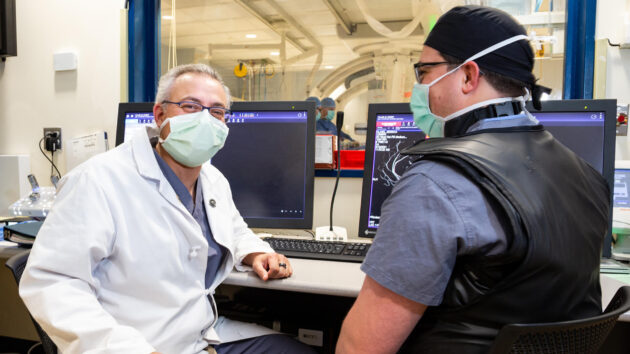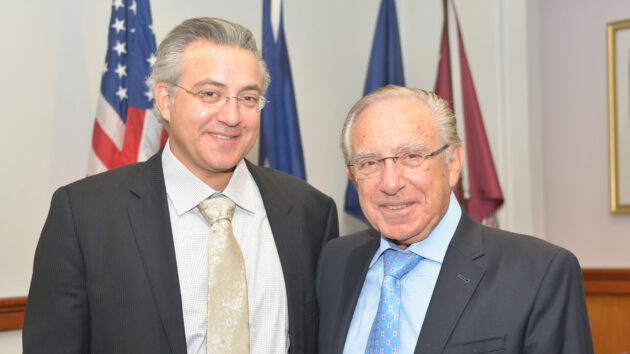Brain Trust: Dr. Alan Boulos on the Nuanced Art of Neurosurgery

There’s a mantra that neurosurgeon Alan Boulos, MD, ’94, repeats to himself when he’s preparing for surgery. He first heard the words 12 years ago as he stood at the bedside of a woman with a ruptured brain aneurysm. She’d been rushed to Albany Medical Center by helicopter after starting her day out normally, happily, on a golf course in Columbia County. Now, with bleeding occurring at the surface of her brain, without quick, meticulous intervention she was facing the possibility of permanent brain damage or death.
Dr. Boulos explained the full extent of her condition to her, her husband and her father, who were standing by her side. The family was from New York City. They all expressed doubt and concern about staying at Albany Medical Center and asked about the possibility of being transferred to a hospital in New York City with which they were more familiar.
Dr. Boulos explained the risks and liabilities associated with such a transfer, as well as their right to do so if they chose.
The woman and her father weighed their options and determined they would like to stay. Her husband wasn’t convinced. More discussion ensued until, finally relenting, he turned to Dr. Boulos and said, “The only way this works out is if you do it perfectly.”
“I think about those words all the time,” Dr. Boulos said. “I imagine all surgeons have some version of this running through their mind when they walk into the OR.”
Dr. Boulos is a fair arbiter of how surgeons think, given that he comes from a long line of them. His grandfather, Samuel Boctor, MD, is credited with bringing modern neurosurgery to Egypt.
“He established the country’s first neurosurgery program, in Alexandria, in the 1950s,” Dr. Boulos said. “After World War II, there weren’t neurosurgeons in Egypt to speak of. There were general surgeons who performed neurosurgeries—and not always well. My grandfather said, we’re missing a piece here. There are patients with head injuries we could be helping so much more.”
So he sought training in England, bringing the discipline back to the Middle East where his son-in-law, Magdy Boulos, MD, followed in his footsteps, specializing in neurosurgery and ultimately moving his family to the U.S.
Dr. Boulos grew up in Rochester, N.Y., and Delaware. “In eighth grade, I thought I wanted to become a lawyer,” he said. “My father responded by taking me to the OR and showing me around.” The experience captured his imagination and he was able to witness the joy that neurosurgery brought to his father.
There is no doubt the gifts of his forebears have influenced him. Both he and his younger brother are neurosurgeons. “My brother took over my father’s practice in 2012,” he said.
Dr. Boulos also married a physician. As a second-year medical student at Albany Medical College, he met Maria Boulos, MD, ’94, when they were both assigned to a study group in obstetrics. An accomplished radiologist who specializes in pediatric imaging, she is another family member who has no doubt influenced him. While they pursued different specialties, Dr. Boulos chose to sub-specialize in neurovascular surgery, a neurosurgical approach that treats problems affecting the blood vessels where radiologists are frequently part of the team. The couple has three sons.
Dr. Boulos has devoted his career to Albany Medical Center and a glimpse at his title suggests the breadth of the work he has done. He is the chair of the Department of Neurosurgery, the Herman and Sunny Stall Chair of Endovascular Surgery, founding director of neurovascular surgery, and professor of neurosurgery and radiology.
He has expanded the department, which was changed from a division to a department just seven years ago, raising its profile nationally and internationally. He has recruited and cultivated new faculty. And—perhaps most importantly—he has carefully selected and introduced new technologies that have the capacity to reverse otherwise fatal or severely debilitating strokes and aneurysms. His partners do the same in other areas of neurosurgery, which have helped improve outcomes for patients with debilitating neurological conditions or tumors.
Neurosurgery is notorious for the skill and steady hand it requires. “You’re operating on a part of the body that remains very mysterious to us,” Dr. Boulos said. “It controls everything, breathing, movement, your senses, what we call ‘the seat of the soul.’ And there is a very narrow margin for error when you’re operating.” One tiny area of damage to the brain can cause a catastrophic disability.
So it is understandable that the husband of the woman from New York City who was facing an emergency neurosurgery in an unexpected place would have been nervous.
But he needn’t have been.
As the patient, Martha Hart Birnbaum, later recounted, things went smoothly. She remembered holding tightly to Dr. Boulos’s hand before she went into pre-op. “After eight and a half hours of surgery and a successful outcome,” she wrote, “I was returned to the ICU, fully lucid and with the ability to speak… Today, I have a fully restored life.”
Her gratitude was so profound that she established the Martha Hart Birnbaum Neurovascular Research Program, a fund to support a database spearheaded by Dr. Boulos that will share clinical data with neurosurgeons across the country to assist them in evaluating treatment options.
While his grandfather blazed a trail in Egypt, Dr. Boulos aims to lay a digital network across the U.S.
And the Birnbaums, for their part, have shed all uncertainty about Albany Medical Center.
“During Martha’s recovery, they frequently commented on the warmth of the nurses and the staff,” Dr. Boulos said. And today, more than a decade later, they still turn to him for their neurological care. The distance doesn’t appear to bother them. “They get in their car and they come up and see us,” he said.
